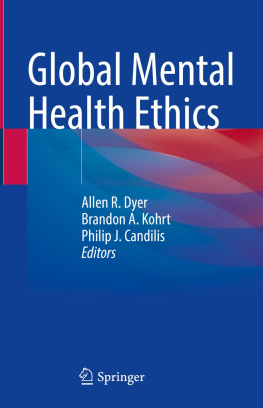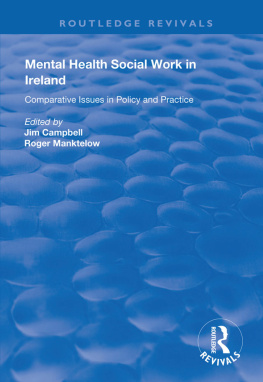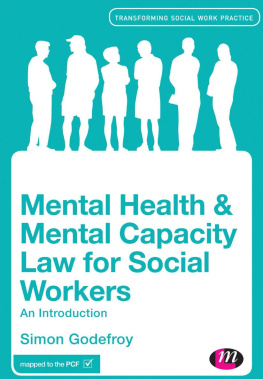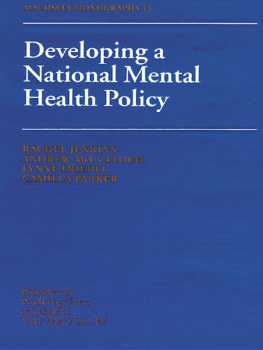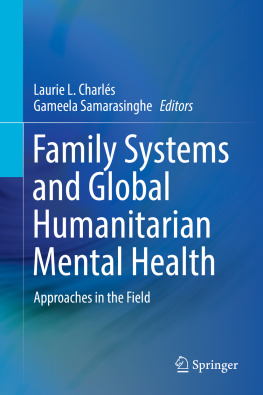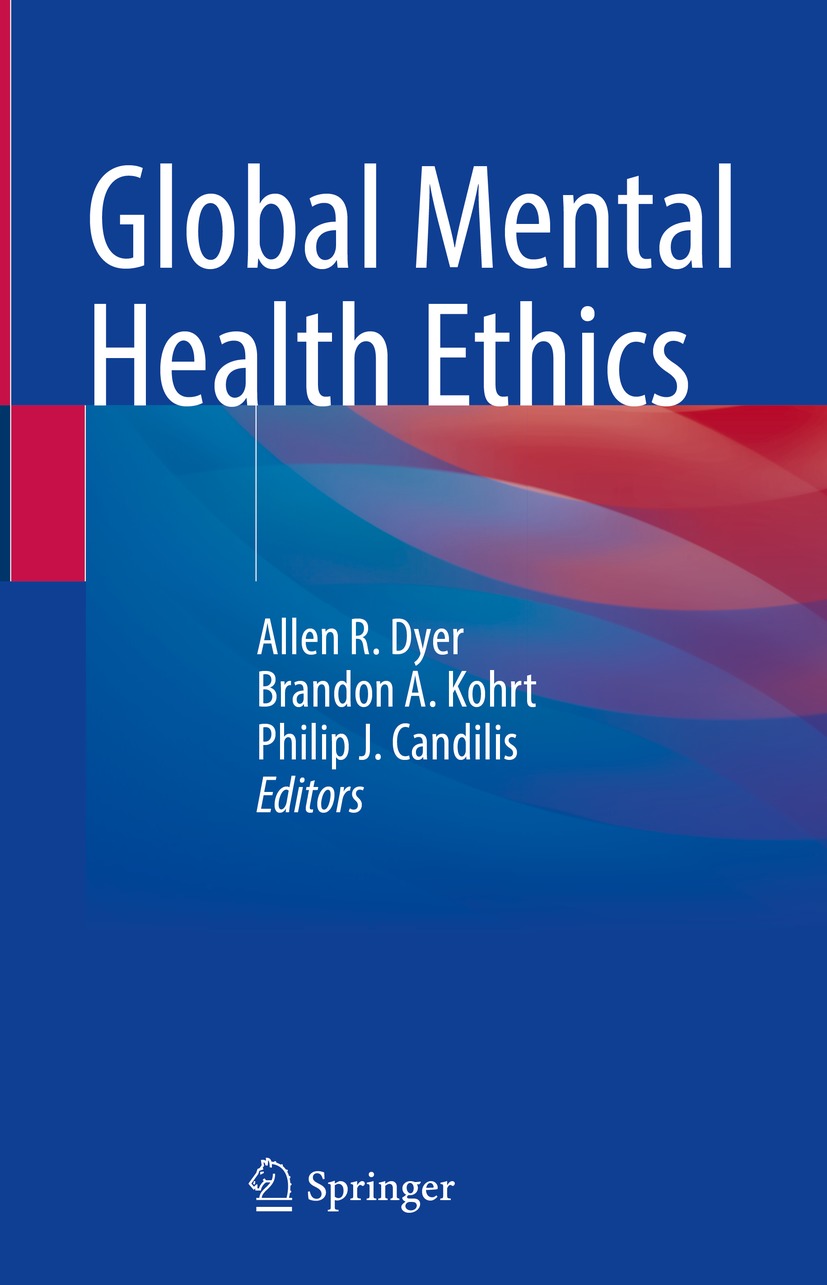Editors
Allen R. Dyer
Department of Psychiatry and Behavioral Sciences, The George Washington University, Washington, DC, USA
Brandon A. Kohrt
Division of Global Mental Health, George Washington University, Washington, DC, USA
Philip J. Candilis
Department of Behavioral Health, Saint Elizabeths Hospital, Washington, DC, USA
ISBN 978-3-030-66295-0 e-ISBN 978-3-030-66296-7
https://doi.org/10.1007/978-3-030-66296-7
Springer Nature Switzerland AG 2021
This work is subject to copyright. All rights are reserved by the Publisher, whether the whole or part of the material is concerned, specifically the rights of translation, reprinting, reuse of illustrations, recitation, broadcasting, reproduction on microfilms or in any other physical way, and transmission or information storage and retrieval, electronic adaptation, computer software, or by similar or dissimilar methodology now known or hereafter developed.
The use of general descriptive names, registered names, trademarks, service marks, etc. in this publication does not imply, even in the absence of a specific statement, that such names are exempt from the relevant protective laws and regulations and therefore free for general use.
The publisher, the authors and the editors are safe to assume that the advice and information in this book are believed to be true and accurate at the date of publication. Neither the publisher nor the authors or the editors give a warranty, expressed or implied, with respect to the material contained herein or for any errors or omissions that may have been made. The publisher remains neutral with regard to jurisdictional claims in published maps and institutional affiliations.
This Springer imprint is published by the registered company Springer Nature Switzerland AG
The registered company address is: Gewerbestrasse 11, 6330 Cham, Switzerland
Preface
Global mental health is at heart an ethical enterprise. The global mental health movement emerges in the twenty-first century from the recognition of inequities in access to mental health care, which adversely impact the quality of life of millions (actually billions) of people across the globe, particularly in lower and middle income countries (LMICs). But in truth, inadequate care for mental health and substance misuse is a problem around the globe, even in otherwise well-resourced areas. As the slogans remind us: There is no health without mental health. And in mental health, everywhere is a developing country.
The World Health Organization (WHO) definition of health famously includes mental health. In the preamble to the UN Constitution, WHO defined health as the state of complete physical, mental and social well-being and not merely the absence of disease or infirmity (WHO, 1948). Although this definition was adopted in the wake of the massive social disruptions of the first half of the twentieth century, it was largely ignored in the latter half of the twentieth century. The understanding of global in global mental health is usually understood to mean around the planet, but harkening back to the wisdom of the original WHO definition of health, global may best be understood as comprehensive, the state of complete physical, mental, and social well-being.
This volume is intended to address a gap in existing textbooks of global mental healthof which there are now several excellent onesby focusing explicitly on ethical considerations that are often implicit in discussions of health policy. The subtitle Ethical Principles and Best Practices links principle and practice, theory and application. What makes a practice good, or better, or best? In suggesting a visual metaphor, the lens of ethics, we look both closely (microscopically) and also from a distance (telescopically) at ethical issues, conflicts, and dilemmas, which often get translated into legal issues, economic issues, or political issues.
This volume may differ from similar texts in one important regard. In order to bring ethical values into focal awareness, the authors were invited to not only state their conclusions, but also to state how they reached their conclusions. While many textbooks report on what are considered to be already established facts, this one considers what should be, and what might be. It looks forward explicitly as well as tacitly. The first person accounts and narratives give nuance to the theories and link theory to practice.
There is a tension that runs throughout work in the field of global mental healthfield understood here as both location where the work is done and also as the discipline(s) studying (and reflecting on) what goes on. That tension might best be represented by the tension between anthropology, the discipline that studies cultures in a detached way, but that also applies those understandings to alleviate human suffering, and psychiatry and related disciplines that treat mental disorders, but also try to understand the social and cultural context in which they occur. The authors of this textbook represent an array of disciplines, including anthropology, psychiatry, and psychoanalysis, forensic psychiatry, child psychiatry, sociology, ethics, philosophy, theology, educational psychology, and law.
This text is designed to be accessible to and useful for students in various health and mental health disciplines such as psychiatry, psychology, social work, and nursing, those in public health and public policy as well as professionals and academics, and those working in health ministries, health departments, and NGOs. It is of sufficient depth and length to be used as a primary text in a one-semester undergraduate or professional level course.
Many of the chapters come from the Global Mental Health program at the George Washington University and our colleagues around the world. We are grateful for all their contributions. We would like to acknowledge especially the second-year residents in our global mental health seminar, who read most of the chapters, offered helpful critiques and suggestions, and in several cases noticed significant gaps in the text and offered chapters to fill those gaps.
The reader of this book might raead chapters selectively from regions of particular interest, or from approaches or themes. Weaving the various disciplines represented by the more than two dozen authors, there are four chapters in particular that serve as pillars on which the structure is built: my own introductory chapter on the lens of ethics and Brandon A. Kohrts chapter on the history of the global mental health movement, Kelso Cratsley and colleagues chapter on human rights, and Philip Candilis concluding synoptic chapter (another visual metaphor) on arriving at the ethics of global mental health.
Focusing on underlying ethical principles sharpens the understanding of best practices, not just in terms of best conventions but the ethical warrants for best policies. The ethics lens is one way to look at particulars from a broader perspective, but also can help sharpen the focus of that broader perspective by elucidating the guiding principles, particularly justice. What can professionals do? What can governments do? What can NGOs do? And significantly, what is the role of communities?

